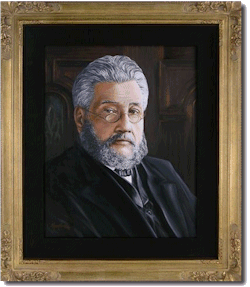by Dan Phillips
Seemed timely in April of 2009; seems timely now.
Now to the most potentially
disastrous aspect of this teaching, in
pastoral terms:
living it out.
Non-moral choices. In their eagerness to

downplay the Scriptures' sufficiency, the Blackabys point out that God told many people to do things that were
not reasonable nor morally necessary, such as where Abram or Isaac chose to live, or whether Peter or Andrew continued in their employment (p. 46).
Remember this: God might lead us to do things that "make us
uncomfortable" (p. 44), are
not logical, and are "
unorthodox" (p. 46; they do not mean
doctrinally unorthodox), and may involve "surrender[ing] ... goals
and comforts in order to become involved in God's activity" (p. 46).
The terrible threat. In what areas does God tell us what to do? Choice of
school,
career,
church,
ministry... even choice of
mate. Oh? Does that mean that there is "
only one right person"? Yep (p. 79). What if I
miss that one right person? God may give us (second-best — or third? seventeenth? four hundred thirtieth?) "marriage and a fulfilled life,"
but "Failing to walk with God always carries a cost..." (p. 80, emphases added).
Whoa! Pause. Seriously, stop everything and
think that one over.
Imagine you are a poor soul,
married to a poor soul afflicted with the Blackaby view. Your spouse believes that he
missed the "one [that was] best suited
the "one [that was] best suited" for him (p. 79). He
missed "
the life partner He has chosen for you" (p. 79), "God's
best" (ibid.), "
that someone who would have been God's
special gift to" him (p. 80).
Every time he looks at you, he might be thinking, "
second-best."
Every time he says he loves you, he might be thinking, "but
not like I'd have loved
that special someone."
No lie. I am not making this up. I don't have to. I actually knew a girl, decades ago, who lived in fear of just this situation.
Her friend's mother "felt" she was "called" to be a missionary. Ah, but she met and married a man who
wasn't so "called." And now this woman would spend the rest of her life knowing that she had
missed God's calling, had
missed God's will for her life! She had settled for
second-best. She had
married second-best.
Did you get that? That was the woman's attitude,
and she communicated that to her daughter! About
her father! (And wouldn't that mean that the
daughter was
second-bes t
t, too?
Not "the child who should have been"?)
So the daughter knew, and now
her friend knew! Word was really getting around, about this poor sap. Can you count the things
Biblically wrong in this picture so far? Even beyond that the whole concept is the
precise opposite of what Scripture says on the subject (1 Corinthians 7:39)?
So now her friend lived in fear that she might meet and love the wrong man — or, more to the point,
any man other than
the one right man — and spend the rest of her life knowing she was out of God's
best will for her life.
See?
"Train-wreck."
 "Ludicrous"?
"Ludicrous"? So how far does this go? What does this "will" include? The Blackabys must get that question a lot, and it clearly stings them. Their reaction is as
rhetorically strong as it is
logically vacant.
One of the most ludicrous questions people ask is: "Should I seek God's will about everything? Must I pray and ask Him what brand of toothpaste I should buy and which breakfast cereal I should eat?" ...Clearly some mundane aspects of our lives are not life-and-death matters; nor will they influence eternity. They simply require wisdom in our decisions (p. 47)
But why is it "ludicrous"?
And how is that "clear," given the argument they've been making? How do we know they "are not life-and-death matters" that will not

influence eternity? After all,
remember that the Blackabys
belabored the point that God had specific directions for "mundane,"
non-moral matters such as where to live, where to eat dinner, where to
sit to eat dinner, whether to stay in a given business. How do we know what
God considers "mundane," given that the Blackabys demand that He direct every detail of our lives,
just as Jesus did with the apostles?
No eternal consequences? How do we know there are not eternal consequences? The Blackabys ridicule the (broadly and deeply Biblical) "extreme view that everything we do, right down to the smallest detail of our lives, is prescribed by God" (p. 61). Their phrasing is characteristically sloppy here, but they
seem to be denying the pan-Biblical truth of providence.
Well then,
if God does not actually have a handle on "the smallest detail" of my life, and
if He has all sorts of things He wants me, Dan Phillips, to figure out that He wants me to do — without the Bible, by struggling to hear and discern His voice and apply all the complex Blackaby-invented signs and tests — then how can
I know where it stops?
Toothpaste and eternity. I'm
absolutely serious. Think about it. The Blackabys scoff at
toothpaste-selection. Well, how do I know?
If I pick this tube of toothpaste right in front of me, at eye-level, I will get to the check out line a few seconds earlier than if I bend down and reach back to pick the one near the floor, where the front packages are missing. Suppose that means that I will pick
checkstand 12, whereas otherwise I would have picked
checkstand 8. Suppose God
wanted — in the Blackaby-God's weak, whispery, ambiguous way — for me to pick checkstand 8, because He was
hoping I would
then hear His
next little mumbly nudge telling me to witness to
that checker, because He had been preparing her heart to hear the Gospel
from me.

But alas! I pick the closer toothpaste. I go to checkstand 12. I am now
out of God's perfect will. Uh-oh. What happens when I am out of God's perfect, individual will? The Blackabys told me: "The
consequences" can be "
disastrous" (p. 48)! And so...
- ...the checker doesn't hear the Gospel from me, and goes to Hell instead of Heaven.

- ...I walk out into the parking lot 12 seconds early, am killed by a white van! Aigh! Bam! Dead!
- I never write that commentary on Proverbs that would have changed hermeneutical history, or that book on Calvinistic Dispensationalism that would have brought all Biblical Christians together in the truth, or preach to tens of thousands of others God was preparing to hear the Gospel just from me!
- ...and they all go to Hell, too!
And all this, every bit of this, is my fault — because I failed to discern and obey that whispery, mumbly, vague and ambiguous "voice of God" that the Blackabys have taught me is absolutely essential to Christian living.
Now maybe you chuckle, or maybe you're angry. But
there are NO OBJECTIVE OR BIBLICAL CONTROLS in the Blackabys' construct to rule any of this out!
That's not a big deal?
Obey/disobey. This is not an exaggeration. The Blackabys constantly speak of divining this whispery, vaporous leading of God in terms of
obedience and
disobedience (pp. 45, 61, etc.)

And well they should! If it is God's
will, then I
must obey, mustn't I? After all,
God is speaking! Does it
get more authoritative than that? Can
anyone think of a time when God says, "Do A," when it is morally indifferent to obey or disobey? Disobeying God is the very
definition of
sin (James 4:17).
Yet I am not sure the Blackabys have even thought this through, even though they're famous for advocating this view. They insist that this will of God, this voice, that they want people to pursue may well
not involve choices "between right and wrong" (pp. 42, 43). Huh? If God
tells me to do A, doesn't that
make it a choice between right and wrong? If He says, in that whispery, unsure murmur I'm to pant after, "Dan, do
A," and I do
B — haven't I done
wrong? Even if God is "saying," "Dan, buy a white car," and I stubbornly insist on buying a car with a real color — am I not doing
wrong? Am I not
sinning?
And this brings us to a question I really would like to ask the Blackabys.
Supposing I was (somehow) born untainted by Adam's sin.
Supposing I never sinned in my entire life. And then...
Supposing God was "telling" me (Blackaby-style) to become a truck-driver, and I became a cook...
...would Jesus have had to die to keep me from going to Hell for being a cook instead of a truck-driver?
Or for picking the wrong seminary? Marrying the wrong person? Buying the wrong toothpaste? Going to the wrong showing of "Fireproof"?
Here is where I would find out how serious they were about their notions. If God
directs me to do something, and I
do not do that, then I have
sinned, and I deserve
Hell for it.
It's just not funny anymore, is it?
No telling who picks up a book. Perhaps most readers will assume the Blackabys' work will fall into the hands of basically stable, sober-minded people. They won't go nuts with the Blackabys' theories. In other words, they won't really take them seriously.
But why not? Suppose, instead, a less-stable, less well-taught, more
obsessive person comes on their work. He shifts into overdrive at the thought of discerning this uncomfortable, inconveniencing, fantastic guidance from God. Now
everything and anything is fraught with numinous overtones! Every "nudge" (their word) or circumstance or random word or even (all possible means of God's guidance, according to the Blackabys; cf. pp. 56-59)
might be the voice of God, speaking to him! Miss it, and face terrible consequences!
So this poor wretch flees the job he's trained for, yanks his family across the country, moves them into a cardboard box to pick over scraps while he starts harassing strangers in Christ's name, because of a
voice he thinks he's hearing... and where could it end? Do not dismiss this: remember, God might lead us to do things that "make us
uncomfortable" (p. 44), are
not logical, and are "
unorthodox" (p. 46), and may involve "surrender[ing] ... goals
and comforts" (p. 46).

If there's a one-for-one carry-on from the Bible, maybe this unstable soul will "feel moved" to have his family live on grasshoppers and honey, like John the Immerser. Or maybe he'll "feel led" to walk around naked, like Isaiah; or cook his food over dung, like Ezekiel. Or maybe he'll tell a ship's captain to throw him overboard, to end a storm, like Jonah.
There are no real, objective, Biblical controls against such behavior in this reckless article.
This is one of the most pastorally-irresponsible articles I've read, from orthodox Christian writers.
 Conclusion: worse? Yes.
Conclusion: worse? Yes. In conclusion, I think this view of God's will is
worse bondage than Pharisaism in this regard.
At least in Pharisaism, you knew where you stood. If you threw up a rock on the Sabbath and caught it with the same hand, you’d violated the Sabbath. It may be a silly rule, but it’s discrete, it's distinct, it's
there.
With this view,
you never know! You might have sinned
merely by picking up the rock! Or maybe you picked up the wrong rock! Or maybe you picked it up with the wrong hand!
You never know! Since the Blackabys stress that this "will" isn't necessarily about right and wrong, it could be about anything... and so
everything becomes a matter of right and wrong!
There is no basis for knowing, no objective control, as long as it is not directly against Scripture.
Summary. After
pro forma niceties about Scripture, the Blackabys assure Christians that what they
really need for a
dynamic, personal, God-pleasing relationship is not to be found there. They would send them on a lifelong rabbit chase for which Scripture can offer no guidance, because it envisions no such pursuit.
Among the products are irrational, unstable, irresponsible and/or chaotic lives. Unbelievers (and believers) who are wronged, hurt, or simply appalled at reckless behavior by the "I-just-felt-led" set
will not glorify God for it. Just "play the God-card," and you're off the hook.
What glorifies God is not a bunch of people acting like fools in His name. I have this notion that
God knows best what will really glorify Him. Hear Him:
See, I have taught you statutes and rules, as the LORD my God commanded me, that you should do them in the land  that you are entering to take possession of it. 6 Keep them and do them, for that will be your wisdom and your understanding in the sight of the peoples, who, when they hear all these statutes, will say, ‘Surely this great nation is a wise and understanding people.’ 7 For what great nation is there that has a god so near to it as the LORD our God is to us, whenever we call upon him? 8 And what great nation is there, that has statutes and rules so righteous as all this law that I set before you today?
that you are entering to take possession of it. 6 Keep them and do them, for that will be your wisdom and your understanding in the sight of the peoples, who, when they hear all these statutes, will say, ‘Surely this great nation is a wise and understanding people.’ 7 For what great nation is there that has a god so near to it as the LORD our God is to us, whenever we call upon him? 8 And what great nation is there, that has statutes and rules so righteous as all this law that I set before you today?
(Deuteronomy 4:5-8)
A better way. Thank God Scripture points us in no such direction!
Thank God that Scripture
is wholly sufficient for teaching, correcting and directing us, so that we may be
fully equipped to serve God (2 Timothy 3:15-17)! God
does talk to us. He talks to us through His living, truly-sufficient Word (Psalm 119:24; Proverbs 6:20-23; Hebrews 3:7-11; 4:12).
And
thank God that He does in fact exhaustively control
everything that comes to pass, so that His children can
never put themselves out of the sphere of His love and blessing and good will (Psalm 115:3; Proverbs 16:1, 4, 9, 33; Romans 8:28-39; Ephesians 1:11).
PS — I did ask God to guide me in writing this review. If you agree with the Blackaby position... how do you know He didn't?
addendum — after yesterday's post, a reader offered a word of testimony, which I've shared
here.





 ot that our present prophet bids us humble ourselves, or seek the Lord by prayer, or invoke the energy of the Holy Ghost, or wait upon the great Head of the Church for deliverance; far from it; he has no burden from the Lord as to such "archaic" and "conventional" instructions; his message to this enlightened and thoughtful age is far better adapted to the present times and the existing phases of society.
ot that our present prophet bids us humble ourselves, or seek the Lord by prayer, or invoke the energy of the Holy Ghost, or wait upon the great Head of the Church for deliverance; far from it; he has no burden from the Lord as to such "archaic" and "conventional" instructions; his message to this enlightened and thoughtful age is far better adapted to the present times and the existing phases of society.























 n the Christian church there is, I am afraid, at this moment too much exaltation of talent and dependence upon education, I mean especially in reference to ministers.
n the Christian church there is, I am afraid, at this moment too much exaltation of talent and dependence upon education, I mean especially in reference to ministers.

 an has become so fallen that he cannot keep the law. Sooner might the Ethiopian change his skin, or the leopard his spots, than he that is accustomed to do evil learn to do well (Jeremiah 13:23); but what man cannot do, by reason of the perversity of the flesh, God performs within him, working in him to will and to do of his good pleasure. Oh, what amazing grace is this, which while it forgives our want of will, also removes our want of power!
an has become so fallen that he cannot keep the law. Sooner might the Ethiopian change his skin, or the leopard his spots, than he that is accustomed to do evil learn to do well (Jeremiah 13:23); but what man cannot do, by reason of the perversity of the flesh, God performs within him, working in him to will and to do of his good pleasure. Oh, what amazing grace is this, which while it forgives our want of will, also removes our want of power!



 Let's just say I'm glad there weren't too many other people around to observe my "power stance" whenever dracula flew by.
Let's just say I'm glad there weren't too many other people around to observe my "power stance" whenever dracula flew by. Somehow, the trophy wife was already able to fall asleep. Not me. I want to be awake when lockjaw sets in.
Somehow, the trophy wife was already able to fall asleep. Not me. I want to be awake when lockjaw sets in.









